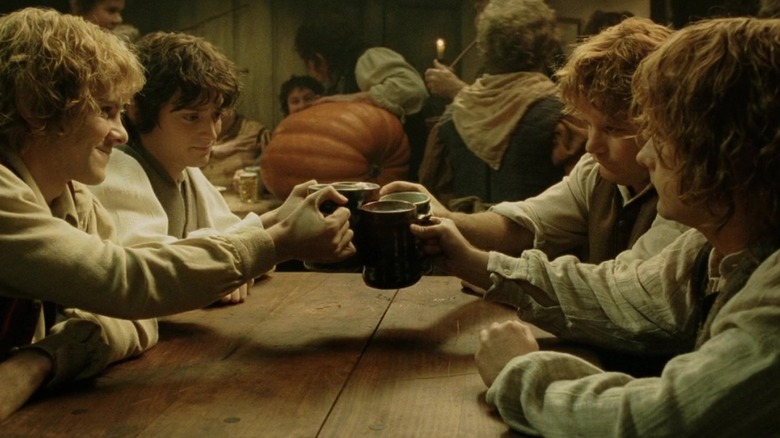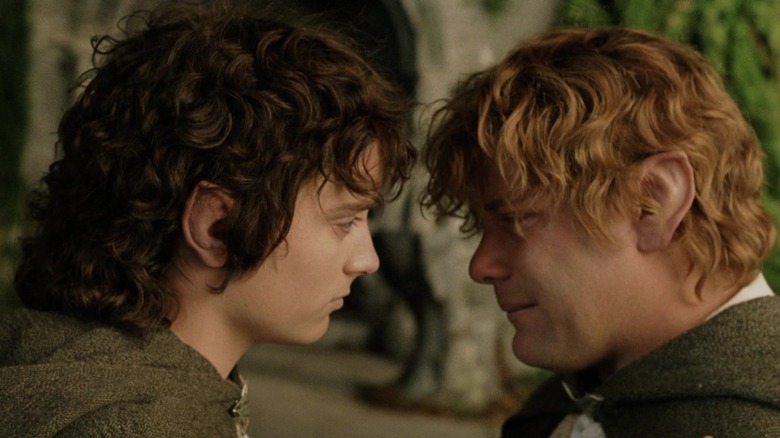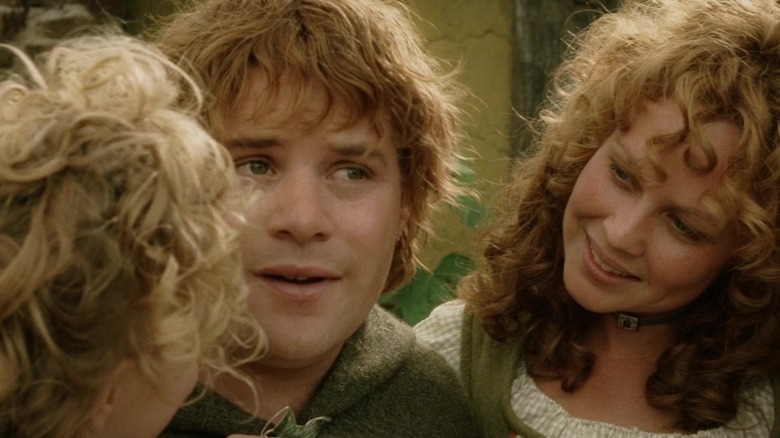Let's End The 20-Year Debate: Lord Of The Rings' Multiple Endings Are Essential
Let's get something clear, "The Lord of the Rings: The Return of the King" has the perfect number of endings, and they are what makes this such an incredible and inimitable trilogy.
There are about 27 minutes of film between the moment the ring goes back into the fiery chasm from whence it came. This includes Frodo and Sam being rescued by eagles. A reunion with the fellowship. The coronation of Aragorn. The return to The Shire. And finally, Frodo sailing off into the West with the elves.
A lesser movie would just end with the reunion and tell all the rest via text on the screen. A slightly better movie would choose to end with The Coronation, as everyone in Minas Tirith kneels before the hobbits, the real heroes. After all, that is the end of the story. The evil has been defeated, and the titular king has returned. But it is not the end of "The Lord of the Rings."
Instead, we need multiple endings, because this is a saga much larger than any one particular story. We have Aragon's story. We have the story of Merry and Pippin becoming heroes and triumphantly returning home. We have Frodo realizing he no longer feels at home in Middle-earth, and we have Sam achieving happiness. It is the combination of all of these scenes that makes this an epic fantasy movie, and a perfect adaptation of J.R.R. Tolkien's work. It is when we have all these endings in a row, in the same film, that this becomes more than just a simple tale of adventure, but a true epic like the tales of old, the sagas that inspired Tolkien, and like the messy stories of the real world.
Homeward bound
"The Return of the King" ends with Aragon's coronation. This is the moment that evil is defeated and the good guys win. The moment when the rightful king takes his throne, and Middle-earth recognizes the bravery and heroism of hobbits. But that is not the end of the saga.
In the era of blockbuster TV, we're used to having the penultimate episode of each season be the end of the story. Then, the last episode ties up loose ends and rounds up the themes with a nice coda. That's what "Return of the King" does. It offers the end of the story first, then continues with scenes that tie up the thematics and the larger story of Middle-earth.
Controversially, Peter Jackson's adaptation doesn't include the "Scouring of the Shire," a chapter in the books where the hobbits finally make it back home, only to find it torn apart by Saruman. It is a gut-punch of an ending, meant to show that war always follows you back home in unexpected ways. Though Jackson doesn't include that scene, he still captures the essence of it. We see that in the scene back at The Green Dragon Inn when the hobbits are finally together and home. What should be a moment of relief and joy quickly turns sour, as the four hobbits realize that nothing will ever be the same. The people around them act like nothing ever happened, but the four hobbits know the truth. They know just how close The Shire (and the world) came to total annihilation. This is the end of the hero's journey a lot of people tend to forget about — returning home, but changed. It is not the ending Tolkien envisioned, but it still is an ending about how war stays with you forever.
There and back again
Then there's the actual ending, the one Frodo and everyone fought so hard for — Sam walking home to his family. After everything, he is whole, and home. That's what it was all about. What the entire saga built towards. The hobbits, the most innocent, least adventurous, seemingly weakest of all creatures, ended up joining the war to end all wars not for fame, nor glory, not even to save man or elvenkind, but to save the peace and tranquility of The Shire.
That Frodo is not going to be there to see it, and not because he died, but because he has to leave Middle-earth, is the final gut-punch that makes Tolkien such a legendary writer, and this such an iconic story. Evil was defeated, but the world did end. Elves left Middle-earth forever, and magic with it. Men, with their goodness, but also their inherent weakness and evil, are now in charge, and the world irrevocably changed. Frodo leaves because he no longer recognizes the world or his part in it, after seeing so much pain and death. He fought to ensure those he loves could remain whole, but he can never join them again. And he can't deal with his own changes, deciding to leave the world behind him. Evil was defeated, and goodness won, but at a great cost.
That's why "The Lord of the Rings" needed this many endings. This is why "The Hobbit" has to be aesthetically different, because that is a simpler tale where the good guys win (though not without losses) and go home to live happily. "The Return of the King" is not that, it is the end of a saga, of an era. Its ending also feels like the ending to an era of Hollywood filmmaking.


